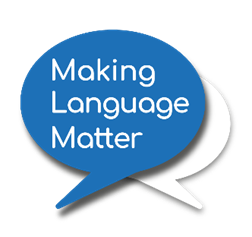Making language matter
In June 2019 Shropshire launched the year of “Making Language Matter”. This was in response to the continued need to focus on communication and language to support our early years' children.

“Research shows that it is not poverty per se which matters most. The child’s communication environment (the early ownership of books, trips to the library, attendance at pre-school, parents teaching a range of activities and the number of toys and books available) is a more important predictor of language development at two, and school entry ‘baseline’ scores at four than socio-economic background alone." (Roulstone et al. 2011)
In 2018 the Department for Education set an ambitious goal to halve by 2028, the number of children leaving reception year without the appropriate level of communication and language skills they require. This will be judged by the % of children achieving at least expected in all the Early Learning Goals (ELG’s) in the Communication and Language and Literacy areas of learning.
The Early Years team are working alongside professional partners who include the Library Service, the Multi-Cultural Development team, Speech and Language Therapists, Health Visitors, the Museum Service and the Music Service and others, to focus on the communication and language of our children from birth.
We run a comprehensive programme of CPD, many of which are focus on communication and language development including training and materials on the award winning ‘Stoke-speaks-out early communication screening toolkit’.
In the Early years foundation stage (EYFS) statutory framework, the importance of conversation runs throughout all the educational programmes.
“Communication and Language. The development of children’s spoken language underpins all seven areas of learning and development. Children’s back-and-forth interactions from an early age form the foundations for language and cognitive development. The number and quality of the conversations they have with adults and peers throughout the day in a language-rich environment is crucial.”
EYFS statutory framework for group and school-based providers (2024: p.10)
EYFS statutory framework for childminders (2024: p.8)
Top tips making language matter
Developing vocabulary:
- Having a child’s attention is important for word learning. Saying an object’s name while helping a child to look at it helps them to learn and remember names for objects that they haven’t seen before.
- We know that having words and objects together is really helpful for early language development, from around six to 18 months. So, it helps your child to see the object you are talking about, as well as hearing its name. This helps them to make the connection and gives you the chance to explain what new words mean. Young children will learn more from seeing, feeling and touching an object than from a picture of it. For example, if you say cat when they see a cat they know that the sounds c-a-t make up a word and it matches the fluffy animal with four legs in front of them.
- Watch what children are exploring and doing then you can say the name of an object or action. This way you’re modelling the word for them – saying what something is called, showing them the way to say it and letting them know the speech sounds that make up the word. For example, in the home corner you talk about them ‘putting baby to bed...she’s under the blanket’.
- Encourage children to use new words by giving them choices. So, rather than saying “Would you like a snack?” ask them “Do you want raisins or cucumber?” You can do this when you’re joining in with play during any activity e.g. “Shall we splash the water or pour it?” “Do you want the big bucket or the small bucket?”
- Repetition is really important. Children need to hear new words lots of times before they learn it properly, so keep saying the word you want them to learn! They may try to copy you and will often take a few attempts to get it right. Repeating experiences gives children a chance to try out things they’re learning and the words for these experiences.
- Building on what they know already can help children to extend and expand their vocabulary. This is why open-ended activities such as sand, water, playdough, painting, craft, home corners (inside and outside) can be used as a basis for varying the activities and the vocabulary that goes alongside. For example, the objects in sand or water can open up a new world where there are fish, sharks, and an octopus swimming around.
- Talk about how words are linked together and how they link to words they already know. They might be similar in what they mean (tall, high, long), or be words in the same group (cat, dog, hamster). Talking about these things helps children learn words well. You can also start naming different types of one thing, for example, if you are playing with dinosaurs you might say ‘dinosaur’ for younger children but as children get older you can name the different types of dinosaurs e.g. ‘That’s a tyrannosaurus – he’s got really sharp teeth.” or “That one is a herbivore”.
- There are different types of words and children need to learn them all. So, they need a good vocabulary of doing words (like walking, swimming, eating, pushing, describing words (like big, heavy, red), and words that can be used to name things (like dinosaur, shark, juice).
Research shows that one of the main impacts on children’s language development is the home learning environment. This requires practitioners to support parents to influence the home learning environment. More information can be found on the Working with Parents page.
Access resources, activity ideas and advice for teaching communication and language to early years children.
Learn more about exploring words as part of the EYFS.